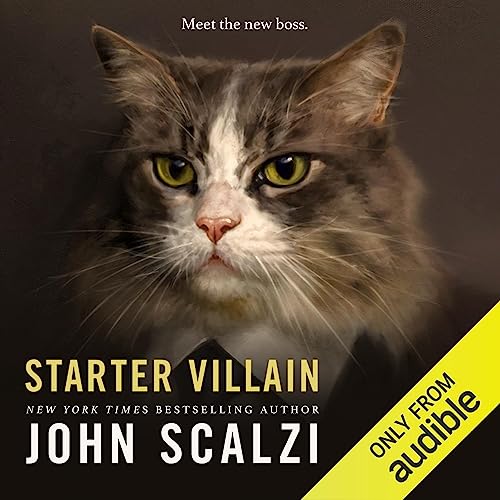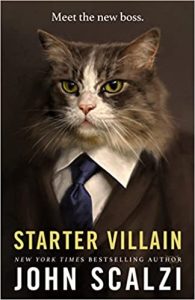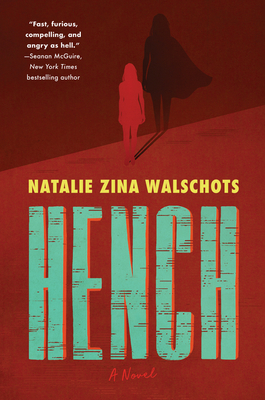 Starter Villain by John Scalzi
Starter Villain by John Scalzi Narrator: Wil Wheaton
Format: audiobook, eARC
Source: publisher, supplied by publisher via Edelweiss
Formats available: hardcover, ebook, audiobook
Genres: science fiction, superheroes
Pages: 272
Length: 8 hrs 5 mins
Published by Audible Studios, Tor Books on September 19, 2023
Purchasing Info: Author's Website, Publisher's Website, Amazon, Barnes & Noble, Kobo, Bookshop.org, Better World Books
Goodreads
Following the bestselling The Kaiju Preservation Society, John Scalzi returns with Starter Villain, another unique sci-fi caper set in the strangest of all worlds, present-day Earth.
Inheriting your mysterious uncle's supervillain business is more complicated than you might imagine.
Sure, there are the things you'd expect. The undersea volcano lairs. The minions. The plots to take over the world. The international networks of rivals who want you dead.
Much harder to get used to...are the the sentient, language-using, computer-savvy cats.
And the fact that in the overall organization, they're management...
My Review:
It’s a truism that “dogs have owners, cats have staff” and in that context, Charlie Fitzer is absolutely the staffer for ‘his’ cat, Hera, and her newly adopted kitten sister Persephone. In fact, Charlie is more Hera’s pet than she is his, something that he is forced to become all too aware of as Charlie’s situation sinks its teeth into him – figuratively and even literally.
As the story begins, Charlie is so far down that he can’t even see ‘up’ from where he’s standing. He’s a journalist without a job because journalism is dying. He’s divorced. The dad he spent the last several years taking care of is dead, and Charlie is living in his dad’s house but only owns one quarter of said house – while his three siblings want him OUT so they can sell it. He wants to buy a local bar so he can get out of substitute teaching and maybe build a life again.
And his great uncle Jake just died, which Charlie only knows about because he used to be a finance journalist – and a good one – and he still can’t resist listening to the finance news. He’s not expecting a legacy from Uncle Jake because Charlie hasn’t seen Uncle Jake since he was FIVE and barely remembers the man nearly 30 years later.
But Uncle Jake, who Charlie always believed was a parking lot magnate – which he was – was also something else. Something Charlie gets more than a glimpse of when he attends Uncle Jake’s funeral and one of the other attendees attempts to stab the corpse.
Uncle Jake was clearly not just in the parking lot business. And now, neither is Charlie. Which is how he discovers that Hera isn’t just a cat, and that truth is not only infinitely stranger than fiction – but that it downright inspires it in ways that Charlie could never have imagined.
At least not until he found himself mediating labor disputes between the management of the not-exactly-secret, über high-tech, super villain headquarters that Charlie himself is now in charge of and a pod of genetically engineered, super-intelligent and seriously pissed off dolphins who are planning to go on strike.
 Escape Rating A: Charlie starts out Starter Villain in WAY, WAY over his head. Part of his charm is that he never loses sight of that fact. He’s always aware that he hasn’t got a clue, and isn’t likely to get one any time soon, and is secretly panicking about it every other minute. Which is a big chunk of why we like him and end up rooting for him so hard, because his inner voice is asking the same questions that a lot of us would be asking in his place.
Escape Rating A: Charlie starts out Starter Villain in WAY, WAY over his head. Part of his charm is that he never loses sight of that fact. He’s always aware that he hasn’t got a clue, and isn’t likely to get one any time soon, and is secretly panicking about it every other minute. Which is a big chunk of why we like him and end up rooting for him so hard, because his inner voice is asking the same questions that a lot of us would be asking in his place.
The setup of Charlie’s world is hilarious and frightening AF at the same time. So much of what happens is utterly silly and bizarre, but with Charlie as our window into this universe we get to secretly giggle – sometimes guffaw – and Kermit-flail in panic right along with him. What makes it work is that the only thing about the over-the-top-ness of it all that Charlie takes seriously are the murders and death threats – which are legion. The trappings of wealth and power are hollow – at least as they apply to him – and he takes all of it with a grain of salt and a look behind the curtain.
So Starter Villain starts out looking like a short course in how to become a supervillain in a few, not so easy, morally ambiguous lessons, only for both Charlie and the reader to ultimately learn that they’ve been outvillained every single hilarious step of the way – and so has everyone else.
There are a couple of niggles that kept this from being an A+ grade, and one that almost put it over the top anyway, because in the end I had an absolute ball with Starter Villain, and not just because of the cats. Although they certainly helped – in exactly the way that cats always do.
The early part of the story is a really hard read – pretty much right up to the point where ‘Tobias the Stabber’ tries to stab Uncle Jake’s corpse to make sure the old man is really dead this time. It’s hard because Charlie is just so far down during that first part of the story, and circumstances continuously hammer that point home to both Charlie and the reader to the point where it feels a bit like ‘piling on’. That’s probably intentional, but it still makes that first part a bit more of a slog than I generally expect from this author.
Speaking of whom, the other niggle that is not a ‘me’ thing but may be a ‘you’ thing is that Charlie is very much the author’s avatar in this one. The bleed through from the author’s public persona to Charlie’s character is obvious. I like the author’s public persona, I’ve been to a whole bunch of his readings and events and often read his blog, Whatever, for his signature brand of giggles, snark and well-thought-out malleting. But I recognize that he’s an acquired taste. I’ve been rather thoroughly infected, and clearly so have a lot of others or his books wouldn’t make the New York Times Bestseller list on the regular. But if you’re not at least neutral to that taste, Charlie Fitzer may not be your jam. If so, I think you’re missing out but YMMV.
The thing that almost put Starter Villain over the top into an A+ anyway is that this is my second ‘read’ of Starter Villain. The first time around, I read it for a Library Journal review, which turned out to be Starred Review and the SFF Pick of the Month that month. So I did love it but that first bit was just hard. (I liked Charlie too much to enjoy watching him suffer – especially from inside his own head.)
This time around I was able to listen to the audiobook (THANK YOU TOR BOOKS!), narrated by Wil Wheaton of Star Trek: Next Gen fame. Wheaton is channeling the author’s public persona so hard and so well that I nearly caught myself checking a couple of times that it really was him and not the author himself – who does do an excellent job of reading his own work at conventions and on book tours.
But all of the above means that, as the character reads like an avatar of the author’s public persona, and the actor is excellent at channeling that same voice, the reading feels almost seamless, like we’re directly in Charlie’s head the whole time and Kermit-flailing right along with him.
In short – which I realize I haven’t been AT ALL – this means that you really, really need to read Starter Villain – especially if you like cats and are sure they’re the ones really in charge of you, your house, and pretty much everything else in the world. And if you have or can create an opportunity where listening to this book in audio will work for you, make it so because it’s even better in audio.

 Hench by
Hench by